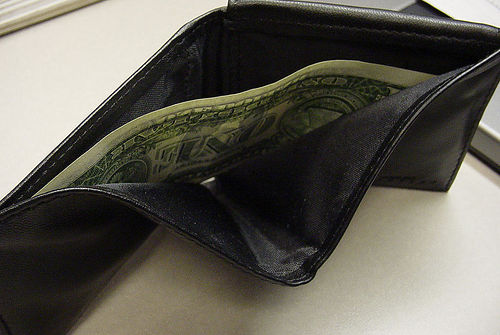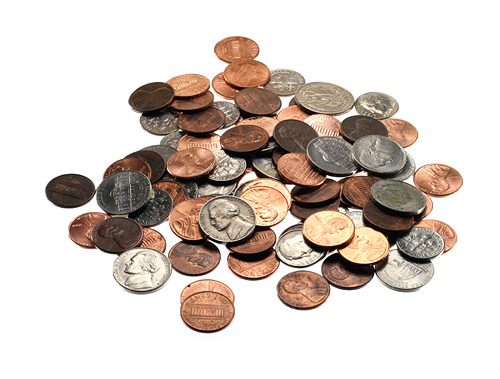Photo by larimdame

This month, the Extended Group Writing Project at PFBloggers asks a very interesting question: What was the poorest time in your life? It made me think. A lot. So I decided to chime in.
I want to begin by clarifying that I’ve never fallen into the category of genuine poverty. To me, poverty is the point beyond budget cuts when you can’t just cut the budget to make ends meet, because you’re already living with so little. When you’re truly poor, you’re not worried about debt and savings. Your main concern is keeping a roof over your head and food on the table.
Thankfully, I’ve never been there, and I’m certainly not comparing my experiences with debt and low income to genuine poverty. That being said, it’s definitely possible to FEEL pretty poor even when you’re not living in poverty.
My first inclination was that a year ago, right after we moved here, was the “poorest” time in my life. Tony’s teaching job didn’t pay nearly enough to make ends meet, and I struggled to find a job for months.
Technically, we had more money in the bank than ever. We’d spent a year saving $10,000 for moving and living expenses. But with very little income, we sure felt pretty poor. It’s a really scary thing when your bank account is dwindling with very little coming in.
The more I thought about it, though, the more I came to realize that my first inclination was wrong. Last year was not the poorest time in my life.
Our living expenses may have been much higher than our income, but our circumstances motivated me to get serious about personal finance. Even though our financial situation was bleak, I felt more empowered than I ever had before. I started budgeting, cutting unnecessary expenses, and tackling debt. Despite our low income, we managed to get through the year without adding to our debt. We even paid off a huge chunk of my credit card debt.
Because I was making the decisions about where our money went, I didn’t feel deprived or scared about money. It was exactly the opposite. When we stopped spending money out of choice rather than out of necessity, we suddenly felt incredibly rich. We realized just how far the money we had could go if we weren’t blowing it.
We made smart choices to make our savings last. For the first time, I was paying my bills a month ahead of time instead of waiting for a paycheck at the last minute. We didn’t have money to buy a lot of stuff or eat out, but we didn’t have to worry about paying our rent or buying groceries. When I think about that, I realize that I didn’t feel poor at all a year ago. Quite the opposite, actually.
On the flip side, I lived pretty opulently in college. I went out to eat a lot. I bought a lot of “stuff.” On the outside, I appeared to be anything but poor. But I never had money in the bank. I blew through what I had so quickly that I often came dangerously close to overdrawing my account. As soon as I got a little money, it was gone. I was stressed every time I swiped my debit card, because I wasn’t sure there was enough in my account to cover it.
One night, my gas tank was so low that my car started sputtering. I knew I had to get gas, but I also knew that I had less than $5 in my bank account. I pulled into the gas station and put one gallon in my tank to make it home. When I got home, I had to check my account to make sure I hadn’t overdrawn it.
That’s the poorest I’ve ever felt.
Sadly, that wasn’t an isolated incident. Stuff like that happened to me a lot in my college days. I had no control over my money, so I didn’t feel like I was making the decisions. Obviously, I was just making the wrong ones. But every time my account balance dipped that low, I didn’t think about all the things I spent my money on. I only thought about what I couldn’t afford.
I still hesitate to refer to that as being “poor,” because it was my own fault. If I hadn’t spent my money on pizza and movies, then I would have had enough to pay for gas. The point is that feeling poor isn’t about the stuff you have or money in the bank. Some people feel “poor” if they can’t afford all the things they want. For me, feeling poor is stressing about whether I can afford the things I need.



